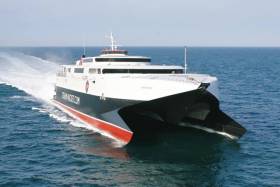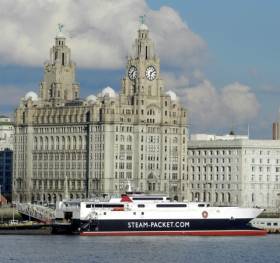Displaying items by tag: Liverpool Landing Stage
Liverpool Link for Isle of Man Steam Packet Under Threat?
#FerryNews - There have been concerns raised that the new Liverpool landing stage for the Isle of Man ferry will not be ready in time.
As IOMToday reports passenger watchdog TravelWatch has released a statement in which it states its ’concern’ at the tight timescale available to ensure the new Princes Half-Tide Dock is operational when the current landing stage deal expires at the end of next year.
The watchdog’s concerns stem from a lack of information regarding contingencies for any delays to the planning application process and what could happen if there are objections to the plans, given the need for the new terminal to be completed by spring 2020.
For more on this ferry development, click here.
#Liverpool - Essential works to be carried out at the Liverpool landing stage costing £540,000 has been agreed by the Isle fo Man Steam Packet Company so to safeguard services to the city for three more seasons.
The major investment is necessary to ensure that fast craft services can continue to operate between Douglas and the heart of Liverpool until the end of 2019, when a new berth will be required.
The contract to use the landing stage at Princes Parade was originally due to expire on 31st December 2016 and owner Peel Ports had indicated Steam Packet Company operations would need to relocate elsewhere. The landing stage was described as ‘time expired’ and too old to maintain but, following a request from the Steam Packet Company, Peel Ports reviewed the condition of the landing stage and identified its lifespan could be extended by three years if extensive essential works are carried out later this year.
As part of the three-year contract extension the Steam Packet Company has agreed to reimburse Peel Ports for the works, which will cost £540,000, securing the popular city centre berth until the end of Manannan’s 2019 season.
There will be no request for the Isle of Man Government to contribute and passenger fares will not be increased to pay for the investment. Scheduled services will not be disrupted when the required remedial works are carried out.
Steam Packet Company Chief Executive Mark Woodward said: ‘The future of the existing landing stage has been in doubt for some time, so we are pleased to be able to give our passengers certainty, at least in the short term.
‘As a business with its sole focus on providing services for the Isle of Man, we know that maintaining a Liverpool route is vitally important to many people in the Island as well as to developing the visitor market. We have now secured an immediate solution, but new facilities will be required longer term.
‘While we may have preferred to remain at Princes Parade, as it is a central location which is convenient for passengers, that is not viable longer term as Liverpool City Council wants to create a dedicated cruise terminal in this area, preventing our services berthing there.
‘Birkenhead 12 Quays, used by Ben-my-Chree during the winter, is not suitable for fast craft, there are currently no other Merseyside berths available and using the Liverpool Dock system would add about 45 minutes to journey time, negating the benefits of a fast craft service.’
He continued: ‘In 2016 Tynwald agreed the Department of Infrastructure could purchase land at Prince’s Half-Tide Dock with a view to creating a berth there. That facility will take time to complete, but our significant investment to retain the current landing stage for a further three years gives Isle of Man Government the time necessary for a long-term solution to be delivered.’
Manx Parliament to Get Say on Liverpool Landing Stage Plan
#LiverpoolBerth - Talks by the Manx Parliament, the Tynwald over a new landing stage in Liverpool for Isle of Man ferries are close to completion, reports IOMToday.
The island's Infrastructure Minister, Phil Gawne gave an update in the House of Keys over plans for a new landing stage in Liverpool to replace the life-expired facility at Pier Head - and he assured MHKs that any proposals would go to Tynwald for approval.
He said officers from his department have been meeting with Peel Holdings to discuss future plans for suitable long-term facilities for Manx vessels.
Topics covered have included where the new landing stage should be located, what facilities should be provided, access, issues surrounding vessel berthing and the likely heads of terms that would lead to a contract.
For more on the story click here plus a photo of passengers embarking in 1978 the Steam Packet's old ferry, Lady of Mann. The vessel also served on their Irish routes now operated by a fastcraft and on occasions a ropax ferry.
Destroyer's Last Visit to Liverpool
The Royal Navy destroyer HMS Manchester is on its last visit to Liverpool, prior to its decommissioning. The Type 42 destroyer is currently berthed at the Liverpool Landing Stage, where she will be open to the public tomorrow (Sunday) between 12 noon and 4 pm.
One of the most notable actions of the warship's three decades in service was during the Gulf War in 1991. The destroyer was engaged in the Persian Gulf. This was primarily to uphold the trade blockade imposed on Iraq during that country's invasion of neighbouring Kuwait.
Special River-Explorer Cruise's run by Mersey Ferries are scheduled for tomorrow. The cruises will provide an opportunity to sail close to the HMS Manchester, which is berthed alongside the Liverpool Landing Stage.
The cruises are scheduled to run between 11 am to 4pm and they include a live commentary from a Blue Badge Guide. On these cruises the normal ticket price applies. For further information contact Mersey Ferries for timetable and ticket fares on 0151 330 1000 or logon to www.merseyferries.co.uk
































































